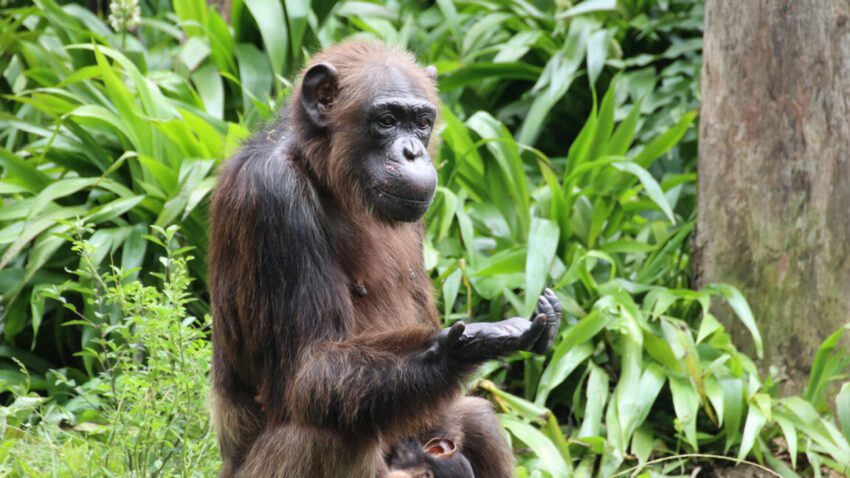
the evolution of rationality how chimps process A recent study reveals that chimpanzees exhibit a level of rationality previously thought to be unique to humans, challenging long-held beliefs about cognitive differences between species.
the evolution of rationality how chimps process
The Historical Context of Rationality
The concept of rationality has been a cornerstone of philosophical discourse since ancient times. Aristotle famously posited that the ability to reason and form beliefs based on evidence distinguishes humans from other animals. This notion has permeated Western thought, leading to a prevailing belief that rationality is an exclusively human trait. Jan M. Engelmann, an evolutionary anthropologist at the University of California, Berkeley, highlights this historical perspective, stating, “You know—ask ourselves if we should really believe that based on the evidence we’ve got.”
Engelmann’s research aims to challenge this long-standing view by investigating whether chimpanzees, our closest living relatives, also possess the ability to process conflicting evidence and adjust their beliefs accordingly. The implications of this research extend beyond the realm of animal cognition; they touch upon our understanding of what it means to be rational and how cognitive abilities have evolved across species.
Chimpanzees and Evidence-Based Beliefs
Engelmann’s study builds on a substantial body of research indicating that chimpanzees can form beliefs based on evidence. Previous experiments have demonstrated that these primates can make decisions influenced by sensory information. For instance, when presented with two boxes, one of which contains a snack, chimpanzees have shown a remarkable ability to choose the box that is more likely to yield a reward based on auditory cues.
Experimental Design
The experiments conducted by Engelmann and his team involved a series of food puzzles designed to assess the chimpanzees’ decision-making processes. In one experiment, researchers shook two boxes, creating a rattling sound. The chimps were observed to consistently select the box from which the sound originated, indicating that they were using the auditory evidence to guide their choices.
This behavior suggests that chimpanzees are not merely reacting instinctively but are capable of processing information and forming beliefs based on that information. Engelmann notes, “There was quite a bit of research showing that chimpanzees can form their beliefs in response to evidence.” This finding raises important questions about the cognitive capabilities of non-human animals and the evolutionary roots of rational thought.
Understanding Rationality in Non-Human Species
The study of rationality in chimpanzees is part of a broader field of research examining cognitive abilities across various species. Understanding how different animals process information can provide insights into the evolution of intelligence and reasoning. Engelmann’s work suggests that the cognitive processes underlying rationality may not be as unique to humans as previously believed.
By demonstrating that chimpanzees can engage in evidence-based reasoning, Engelmann’s research opens up new avenues for exploring the cognitive abilities of other non-human animals. This could lead to a reevaluation of how we define rationality and the criteria we use to assess it in different species.
Implications for Evolutionary Anthropology
The implications of Engelmann’s findings extend beyond the realm of cognitive science. They challenge the anthropocentric view that has dominated the field of evolutionary anthropology. If chimpanzees can exhibit rationality, it suggests that the cognitive abilities we often attribute solely to humans may have deeper evolutionary roots.
Revisiting the Definition of Rationality
Engelmann’s research prompts a reconsideration of what it means to be rational. Traditionally, rationality has been defined in terms of human capabilities, often overlooking the potential for similar processes in other species. By expanding the definition to include evidence-based reasoning in chimpanzees, we can gain a more nuanced understanding of cognitive evolution.
This shift in perspective could have significant implications for how we study animal behavior and cognition. It encourages researchers to look for signs of rationality in a wider range of species, potentially leading to groundbreaking discoveries about the cognitive landscape of the animal kingdom.
Stakeholder Reactions
The findings of Engelmann’s study have sparked interest among various stakeholders, including researchers, animal rights advocates, and educators. Many in the scientific community are excited about the potential for new research directions that could emerge from this work. The ability to understand and interpret evidence is a fundamental aspect of cognitive science, and Engelmann’s findings may encourage further exploration into the cognitive abilities of other primates and mammals.
Animal rights advocates have also responded positively to the research, as it underscores the cognitive complexity of non-human animals. By demonstrating that chimpanzees possess rational thought processes, the study may contribute to ongoing discussions about animal welfare and the ethical treatment of intelligent species.
Educators and those involved in wildlife conservation may find the implications of this research particularly relevant. Understanding the cognitive abilities of chimpanzees can enhance educational programs aimed at raising awareness about the importance of conserving their habitats and protecting their populations.
Future Research Directions
Engelmann’s study opens the door to numerous future research opportunities. One potential avenue is to explore the extent of rationality in other primate species, such as bonobos or orangutans. By comparing the cognitive abilities of different species, researchers can gain insights into the evolutionary pathways that led to the development of rational thought.
Another area of interest is the investigation of how environmental factors influence the decision-making processes of chimpanzees. Understanding the role of social dynamics, habitat, and resource availability could provide a more comprehensive picture of how these factors shape cognitive abilities in wild populations.
Technological Advancements in Research
Advancements in technology may also play a crucial role in future studies. The use of neuroimaging techniques and advanced behavioral tracking systems can provide deeper insights into the cognitive processes underlying rationality in chimpanzees and other animals. These tools can help researchers observe brain activity in real-time, offering a more detailed understanding of how evidence is processed and decisions are made.
Conclusion
The research conducted by Jan M. Engelmann and his team marks a significant step forward in our understanding of rationality in non-human animals. By demonstrating that chimpanzees can process conflicting evidence and adjust their beliefs accordingly, the study challenges long-held assumptions about the uniqueness of human cognition. As we continue to explore the cognitive abilities of various species, we may find that the roots of rationality run deeper than we ever imagined, reshaping our understanding of intelligence in the animal kingdom.
Source: Original report
Was this helpful?
Last Modified: November 17, 2025 at 3:36 am
3 views















